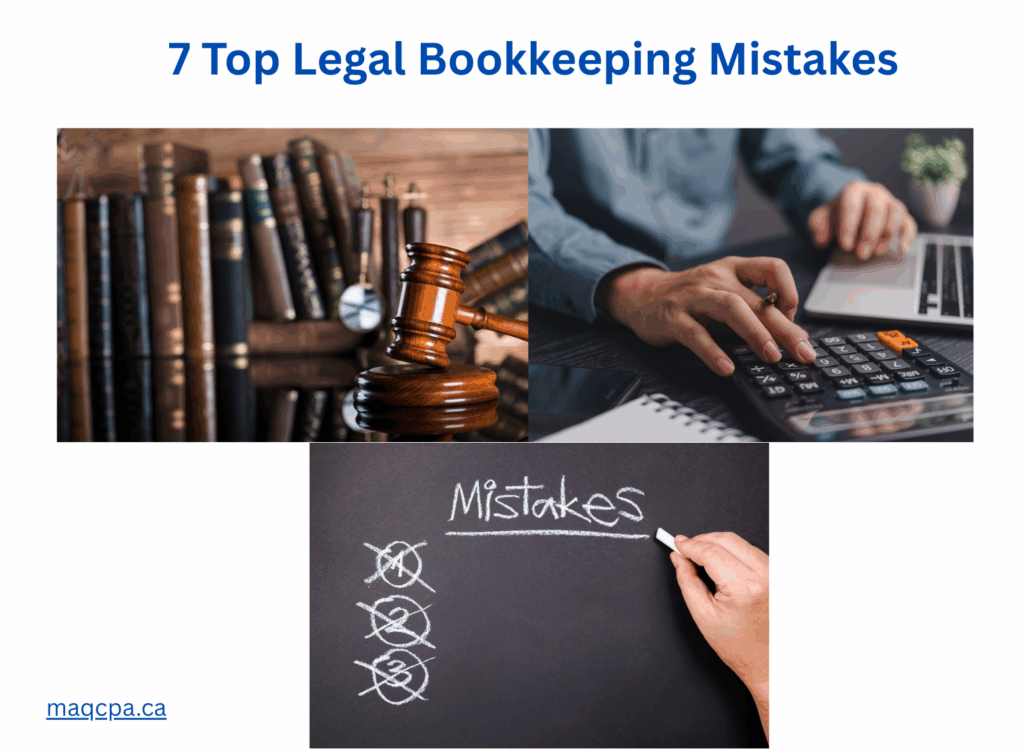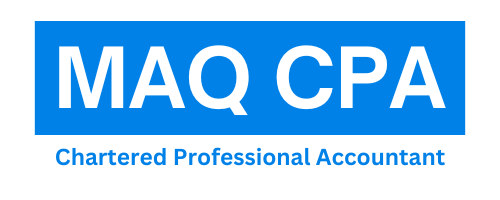If you’re running a law firm in Ontario — whether as a solo practitioner in Markham or a growing practice in downtown Toronto — you need to treat your financial records as more than admin work. The CRA and LSO both expect full compliance with their rules, especially when it comes to handling client trust money and tax obligations.
Legal bookkeeping mistakes can easily trigger audits, and if your records don’t meet the standards outlined in By-Law 9, you may face penalties, fines, or even disciplinary action.
This guide breaks down the 7 most common legal bookkeeping mistakes that lead to CRA or LSO audits — and how your law firm can avoid them.

✅ Key Takeaways
The information provided in this blog is for general informational purposes only and does not constitute professional accounting, tax, financial, or legal advice. While we strive to ensure the accuracy and timeliness of the content, the information may not apply to your specific situation or reflect the most current legislative changes. Readers are strongly advised to consult a qualified professional before making any decisions based on the content of this blog. MAQ CPA and its representatives disclaim any liability for any loss or damage incurred as a result of reliance on any information provided herein.
- Ontario law firms must reconcile trust accounts monthly under By-Law 9 of the LSO.
- Mixing client funds or disorganized ledgers are major compliance red flags.
- CRA audits often stem from HST misreporting and missing records.
- General bookkeepers may not understand trust account protocols.
- Preventative compliance is key to staying off the audit radar.
❌ Mistake #1: Skipping Monthly Trust Account Reconciliations
Ontario lawyers must reconcile trust accounts monthly within 25th of the following month, even during months with no activity. This is clearly outlined in By-Law 9, section 18 of the LSO’s regulations.
🚨 Why it triggers audits:
Failure to perform monthly trust reconciliations is a red flag during LSO spot audits and suggests potential misuse of client funds.
🔍 What to do instead:
- Follow By-Law 9 requirements for:
- Comparing bank statements to client ledgers
- Preparing a reconciliation summary and detailed listings
- Signing and dating the reconciliation
- Comparing bank statements to client ledgers
- Automate the process with legal accounting software or delegate to a CPA or legal bookkeeper Markham
📘 Reference: LSO – Trust Account Reconciliation
❌ Mistake #2: Mixing Client Trust Funds with Operating Funds
Depositing client retainers into your general account or moving funds from trust before they are earned is strictly prohibited.
🚨 Why it triggers audits:
This violates the rules under By-Law 9 and is often seen as a misuse of client property — a serious compliance breach.
🔍 What to do instead:
- Open and maintain separate trust and general bank accounts
- Only transfer funds after earned fees are invoiced and client is notified
- Document all transfers with supporting entries and receipts
❌ Mistake #3: Incomplete or Disorganized Client Ledgers
Every law firm handling trust funds must maintain individual ledger for each client matter, showing all receipts and disbursements.
🚨 Why it triggers audits:
Missing or inaccurate client ledger records can result in disciplinary review or audit escalations.
🔍 What to do instead:
- Ensure each client ledger is updated immediately after transactions
- Reconcile ledgers against the trust bank account monthly
- Maintain digital backups
❌ Mistake #4: Misreporting GST/HST on Legal Fees and Disbursements
Improper handling of GST/HST is one of the most common ways law firms attract CRA audits.
🚨 Why it triggers audits:
CRA often audits law firms that incorrectly charge or report HST, especially on disbursements or third-party costs.
🔍 What to do instead:
- Understand which services and disbursements are taxable
- Break down GST/HST clearly on invoices
- File HST returns on time (monthly, quarterly, or annually based on your reporting cycle)
📘 Reference: GST/HST for Legal Services
❌ Mistake #5: Failing to Keep Required Records for 6+ Years
The CRA and LSO both require records to be retained for at least six years from the end of the fiscal year.
🚨 Why it triggers audits:
Missing or incomplete records during an audit creates suspicion and may result in disallowed expenses or penalties.
🔍 What to do instead:
- Maintain:
- General and trust ledgers
- Receipts and invoices
- Bank statements
- Reconciliation summaries
- General and trust ledgers
- Store securely in digital formats and cloud backups
❌ Mistake #6: Hiring a General Bookkeeper Without Legal Experience
Legal bookkeeping requires a deep understanding of trust accounting rules, By-Law 9, and CRA reporting. Most general bookkeepers aren’t trained for this.
🚨 Why it triggers audits:
Improper reconciliations or fund transfers due to lack of legal expertise are major red flags.
🔍 What to do instead:
- Work with a CPA Accountant or legal bookkeeper Markham who specializes in legal accounting
- Ask if they understand LSO trust rules and reconciliation requirements
- Have them review compliance checklists quarterly
❌ Mistake #7: Ignoring LSO By-Laws and Reconciliation Rules
Some firms assume that if they don’t touch the trust account, they can skip reconciliations or ignore the LSO’s requirements.
🚨 Why it triggers audits:
Even inactive trust accounts must be monitored and reconciled monthly. Ignoring this puts your firm out of compliance.
🔍 What to do instead:
- Treat monthly reconciliations as part of your firm’s routine
- Review By-Law 9 periodically and keep your firm’s procedures aligned
- Document compliance activities in case of an audit
📘 Reference: LSO By-Law 9 – Financial Transactions and Records
✅ How to Stay Audit-Ready All Year
| Task | Frequency |
| Reconcile trust and general accounts | Monthly |
| Review client ledger balances | Monthly |
| File HST returns | Monthly, Quarterly, or Annually |
| Back up financial records | Weekly/Monthly |
| Review By-Law 9 compliance checklist | Quarterly |
| Work with CPA or legal bookkeeper | Ongoing |
FAQ – Legal Bookkeepers Toronto / Scarborough
Is there a standard form for trust reconciliation?
The LSO does not provide a specific form. However, the reconciliation must include all components required under By-Law 9, including bank balances, book balances, and client ledger totals.
How long do I need to keep financial records?
At least six years from the end of the last fiscal year they relate to — both for CRA and LSO compliance.
Can I use my general accountant to manage trust accounts?
Not recommended. Trust account rules are very specific, and errors could lead to disciplinary action. Use a legal-specialized CPA or a legal bookkeeper Markham.
What happens during an LSO spot audit?
The LSO will review trust reconciliations, client ledgers, disbursements, invoices, and compliance with By-Law 9. Inconsistencies or missing records can escalate the review.
Are disbursements subject to HST?
Some are, some aren’t. Disbursements billed to clients must be reviewed for taxability. Incorrect handling can trigger a CRA audit.
Final Words
If your legal bookkeeping isn’t meticulous, you may already be on the radar of the LSO or CRA — even if unintentionally. But with proper systems, monthly reconciliations, and legal-specific support, your firm can reduce audit risks and operate with peace of mind.
📞 Need legal bookkeeping help in Ontario?
We’re a Toronto-based CPA firm that specializes in bookkeeping, tax filing, trust accounting, and compliance for law firms across Ontario.
👉 Book your audit readiness consultation today.
Read about our service page for Bookkeeping for Law Firms
Disclaimer
The information provided in this blog is for general informational purposes only and does not constitute professional accounting, tax, financial, or legal advice. While we strive to ensure the accuracy and timeliness of the content, the information may not apply to your specific situation or reflect the most current legislative changes. Readers are strongly advised to consult a qualified professional before making any decisions based on the content of this blog. MAQ CPA and its representatives disclaim any liability for any loss or damage incurred as a result of reliance on any information provided herein.
